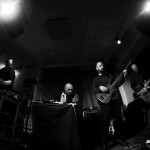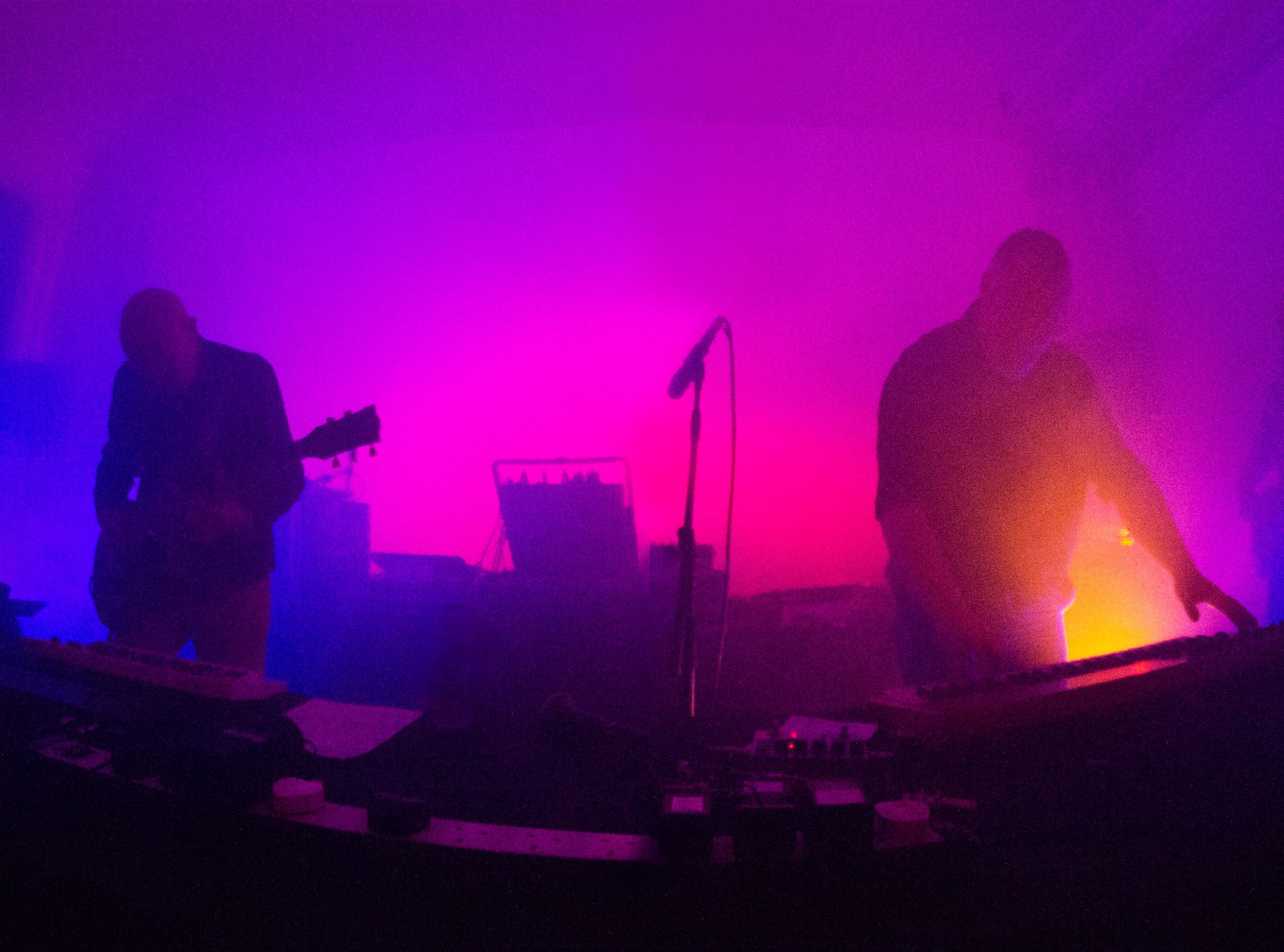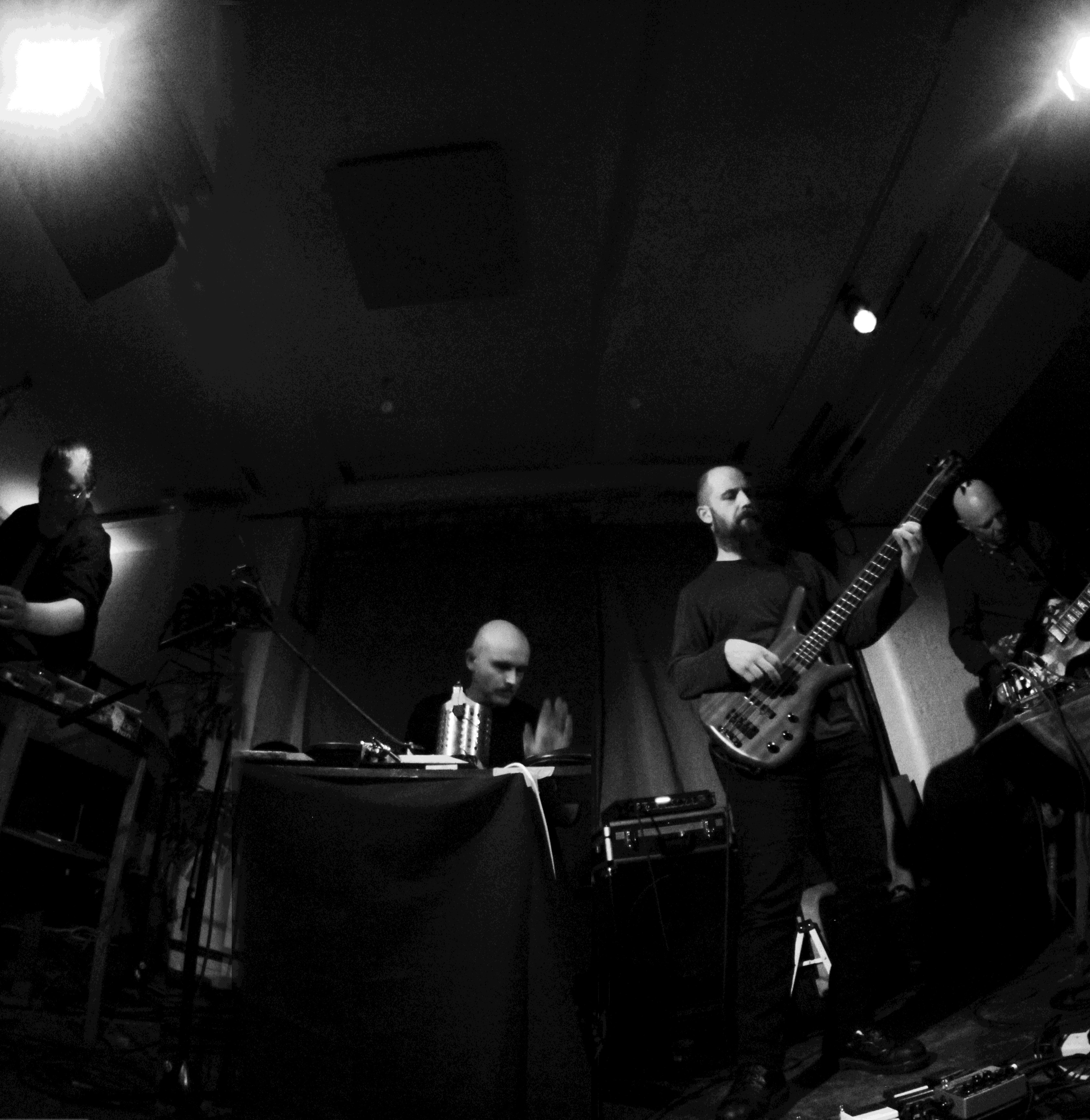 David Knight and Stephen Thrower bring together several decades of experience with music that has always operated beyond the mainstream and simple categorizability. The musical pedigrees of the two, including Coil and Cyclobe (Thrower) and Shock Headed Peters, The Stargazer’s Assistant and Arkkon (Knight) are certainly familiar to readers of these pages. Eight years ago we talked to them about their music, which is the result of improvisation and experimentation. Since then Touch released the two albums “Transpandorem” and “Sensudistricto”, the “Omegapavillion”-tape, the “Fuse Fire Vortex”-7” and recently the “Zurnica-U”-CDR. So it seemed to be time to talk to both of them again.
David Knight and Stephen Thrower bring together several decades of experience with music that has always operated beyond the mainstream and simple categorizability. The musical pedigrees of the two, including Coil and Cyclobe (Thrower) and Shock Headed Peters, The Stargazer’s Assistant and Arkkon (Knight) are certainly familiar to readers of these pages. Eight years ago we talked to them about their music, which is the result of improvisation and experimentation. Since then Touch released the two albums “Transpandorem” and “Sensudistricto”, the “Omegapavillion”-tape, the “Fuse Fire Vortex”-7” and recently the “Zurnica-U”-CDR. So it seemed to be time to talk to both of them again.
You once said that you decided on the name UnicaZürn relatively spontaneously under the impression of the anagrams of the artist of the same name. It wouldn’t be unusual if years later the name would have taken on a life of its own for you independent of its origin. Regardless of that, do you still have a connection to the artist and to the time when you discovered her?
Dave: In a way the name has become both a blessing and a (mini) curse for us. At the time it was a purely random choice by Steve, from a book spotted on the table in his house. Of course we love her and her work, that was never an issue, but as with most of our work, it came from a playful appreciation and arranging of sounds and words – not so much of an intentional manifesto. Personally, I love her visual work. Like Steve’s partner Ossian, I collect the artist Austin Osman Spare (although it’s more difficult these days). But surrounding yourself with the creations and ideas of a truly original maverick is very inspiring, and I hope the same can be said of our relationship to the works of Unica Zurn.
It seems a rather profane question but when you compare a more improvised recording like your latest CD-R with your last two albums on Touch, to what extent do the approaches differ?
Steve: Everything we do starts from improvisation, it’s just that in many cases we then edit, process, overdub, and sometimes obliterate the original sounds. The difference on the Zurnica-U CD is that we have left the improvisations intact, with no further alteration. These were three pieces where we felt almost no desire to make changes, given how pleased we were with the ‘first take’. There are a few fluffed notes here and there, but nothing that spoils the flow.
Is there a UnicaZürn mode for you in which you improvise on your own or collect ideas? If so, how would you describe it? Are there pieces that were created together from scratch without conscious ideas in the back of your mind?
Steve: We do sometimes improvise ‘solo’ and then combine our efforts, looking for a spontaneous unity. It can be a wonderful process to hear two lengthy improv pieces, recorded separately, suddenly slip into synch, into a new form and relationship, when put together. When I interviewed film composer Wayne Bell for one of my books I asked him about his amazing freeform soundtrack for The Texas Chainsaw Massacre (which he recorded with the director, Tobe Hooper). He said that they made multiple recordings without seeing the image, just riffing on a mood. Then they would synchronise the new music track to the start of a scene, and just let it run until the emotional ‘match’ drifted out of sync’ or no longer worked, at which point they would cut the audio and start again with another piece. What was interesting, he said, was the way accidental confluences of sound and picture would arise in a fascinatingly organic way: far better than if they’d laboured to write a score that matched every ‘beat’ of the action. In some ways this is analogous to the way we work sometimes, except that there are two audio tracks, not an audio and image track.
We very rarely begin with conscious ideas. There might be a few suggestions to ‘try something nastier’ or ‘warmer’ or ‘quieter’ etc, but really, the worlds that we create arise in real time and it’s up to us to recognise them, sustain them, nurture them as they require, then later build on them and polish them up.
What role does chance, do accidents play in the process of creating your music?
Steve: Accidents are gifts. Always worth unpacking and taking a look at. Maybe sometimes they’re gifts you don’t want, things you can’t use, which you quickly drop in the bin. But there are amazing gifts too, that you didn’t even know you wanted until they arrive. You do your best to make them part of your world.
 Apart from your specific instruments and sound sources, is there some kind of division of labor between you and Stephen?
Apart from your specific instruments and sound sources, is there some kind of division of labor between you and Stephen?
Steve: Dave’s better at organising things socially, the human interaction side of things. I tend to come up with the song titles, and handle press releases.
When you’ve got music that is primarily instrumental, titles can guide a listener – at least to a certain extent. “Pale Salt Seam“ references Frederico García Lorca. Could you say a few words about the ideas behind that track?
Steve: Titles are a blessing and a curse. They offer a way in, but at the same time if you’re not careful they steer people into cul-de-sacs. They need to be evocative enough to pique your interest, but vague enough to avoid stamping on the subtleties of your music. With a long track running twenty minutes, and moving through multiple spaces and moods, a title can seem horribly reductionist, like you’re putting a tiny caption on a lavish painting. So you look for word games that have a playful poetry to them, or a phrase where what matters more than sense is the melodiousness in the words. There are a couple of titles of ours that draw on poetic writing (Lorca, as you say, whose poems I love) but they’re always taken hugely out of context and are not intended to drag the whole edifice of the poet into the picture. They’re like fragments of another world sharing their light with ours. “Pale Salt Seam” I like next to our music because it conveys a sense of elongated time, mineral time, sedimentary time.
Let’s briefly talk about your latest release “Zurnica-U“. I was wondering about the use/creation of the portmanteau word “Ancident“. At the beginning it feels as if you are listening to a transmission from some primordial region. But then there seems to be – at least for me – the proverbial light at the end of the tunnel. What can you tell us about that track?
Steve: Yes, it’s a collision word, as if ‘ancient’ and ‘accident’ have smashed into each other. We’re all the shrapnel of some ancient accident! I love the way that piece starts. It is primordial as you say. Then there’s a weaving kind of string or cord coming through, a beautiful line played by Dave Smith. Also, I like ‘Ancident’ because it feels like a ‘corner word’, turning a corner inside itself. If you get images like that from a title, abstract shapes from a play on words, that can make for a good title. It’s derived from recognisable language but it also seems to escape it. Just like the music, hopefully!
A few years ago, Touch Records described “tidal imagery, oceanic forms and the slow rhythms of coastal water” as the structuring elements of your album “Transpandorem”. Would you say that where you live (near the Thames and on the East Sussex coast) influences your relationship to water?
Steve: Yes. And through travel too. I’m always so impressed by the ocean! I went to Los Angeles a couple of years ago and we went sailing on a friend’s boat just off San Pedro, where all the giant merchant ships come to dock. They cross over the Pacific from China and Japan, huge monstrous metal things, a great procession of them stretching to the horizon. I found myself staring out over the Pacific, which gives you a very strange sensation, knowing that it could be five thousand miles from your eye to the nearest shore. Here where I live it’s forty or fifty miles to France so we don’t get quite the same sense of vertigo! But I love the sea, the sound of it, the size of it. Another world. It may be dark, but it’s never empty…
Your music awakens “cosmic” associations in many listeners and you yourself have already used this term. Do you think there is a common element of cosmic expanses and maritime depths, and if so, could it be that this connection can also be found in your music?
Steve: Yes. absolutely. If we can make music that touches some of the size and majesty and mystery of the cosmos, that in some way imagines itself outwards and into those further reaches, that to me is an aim that never grows stale. How could it? As long as you strive to find new contours and aural metaphors. As a source of intellectual and emotional pleasure, it’s boundless and always there for us.
“Cosmic“ is nowadays also invoked when talking about certain types of horror fiction (strongly influenced by H. P. Lovecraft’s so-called cosmicism). There the cosmos is invoked to stress humanity’s tiny part in a vast cosmos which is at best indifferent whereas the cosmic associations your music often creates (I’m thinking of “Transpandorem“ for example) seem to evoke a much less bleak picture. Would you agree?
Steve: Lovecraft is fantastic, I’ve always loved his stories. In his writing you feel a terror at the absurdity of our tiny existence, but there’s a sense of awe too, confronting the sheer vastness and difference of things.
Transpandorem isn’t bleak, I agree. Nor Sensudestricto, really. They feel very positive to me, with the exception of “Stems of the Shadowmind” perhaps, which is more melancholic and sombre.
On your releases you have worked together with other artists. How do you decide who may be a suitable collaborator on the respective release?
Dave: I have been working sporadically with Danielle (Dax) since 1983, so it was completely natural to ask her to contribute voice to our first album (as well as occasional artwork). Steve and I had both worked with David Smith in the improv collective Steve had started in the late 90’s, The Amal Gamal Ensemble (as had Danielle) – there are a couple of short live clips on YouTube which feature all four of us. So as they were already ‘in the family’ so to speak, they were both first port of call when we decided to add extra elements for recordings or live work. Steve and I had done several gigs as a two-piece, but in a live context especially I feel it needs more input, both in a sonic and visual sense. It also mixed things up a bit for us, which was stimulating. I have to be honest and say that personally I don’t find watching two guys hunched over tables of technology to be the most exciting concert experience, regardless of the sounds they are making. The interplay, tensions, and possibilities created by having extra people on the stage or in the studio can’t be overstated. The first time we played at Café Otto as a four piece had a real buzz about the evening – I still consider it one of the most exciting gigs I’ve played. Just before Lockdown Sam Warren started recording and playing bass live with us, which adds another element altogether, as well as giving the whole project a hefty bottom end! He is such an inventive musician, it’s been an honour to work with all our musical collaborators.
In 2021 you released a very limited 7” called “Fuse Fire Vortex“. In an interview from a couple of years ago Stephen said that you are “fond of long-form pieces, extended trips“. On “Fuse Fire Vortex“ you condensed your sound into two three-minute tracks and on your bandcamp page it says that here you can hear UnicaZürn “inminiature“. Could you tell us a bit about how you approached these recordings?
Dave: Our great friends Graham and Michael approached us regarding doing a 7-inch single for their Heavens Lathe label project.
We found it a fascinating challenge considering the usual long scale of our work, so immediately agreed. I had spent the 80s working on almost ‘traditional’ song structures, so after three decades of free-form large-scale pieces found it incredibly exciting to go back to a ‘single’ mentality. Although I consider myself an improviser these days, I do like the constraints of form sometimes! That being said, the spine of the track is taken from a live performance of one of the tracks from Sensudestricto, so has its roots in improvisation filtered through a later live performance, and subsequently embellished.
Recently there was a feature on you in The Wire you talked about the “tactile pleasure“ to instruments, to gear. Could you imagine a situation in which you would (be willing to) work solely using a laptop and software or is that something that goes totally against your approach to music? Where do feel more comfortable: In a studio setting or on stage (where maybe an element of unpredictability is always present)?
Dave: I’m not sure I have the patience to work with software based instruments. I like the immediate tactile pleasure too much. I remember years ago when we went into a recording studio with the Amal Gamal Ensemble and I noticed a slight latency delay in my headphones, it really took all the pleasure out of performing, when nuance is down to milliseconds, I wondered what the point of doing anything was if it is being obliterated by the limits of technology. I may be living in the past, but because of that we do most of our improvised recordings direct to a multitrack recorder, then transfer to a computer for tweaking and overlaying.
That being said, most of our finished pieces have been worked over and over on a computer. Editing and overlaying and tweaking is an integral part of our work. Artifice, the unnatural, and the undecipherable are our friends, so we would not always be looking to maintain the ‘integrity’ of a performance, necessarily. All that being said, as your question asked, I really don’t get turned on by software instruments, I’ve tried, but it just don’t float my boat!
Is there anything either of you want to say about upcoming projects/releases? For example, are there already plans for a new full length release?
Dave: We are currently working on a few different pieces – where they take us and where they will go or where they will end up isn’t known at the moment. The current one we are working on lasts for about an hour so far! We are thinking of releasing more CDRs through Bandcamp, as their very nature denotes an opportunity to release things that are a little bit ‘from the archive’ as opposed to The Next Great Release. We have tons of material dating back 25 years from the time we first started working together so it would be like nice to let some of that see the light of day. The last time we got together with Dave Smith and Sam Warren (from the live band) in a recording studio we laid down at least six hours of material – it would be a shame to see that just go to waste, in fact some of it made up the Zurnica-U CDR, and that is a course I would like to see us pursuing more, personally speaking.
Interview: M.G. u. U.S.
Photos: Ruth Bayer
